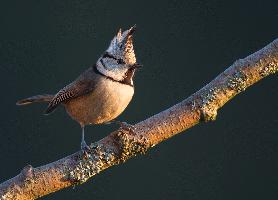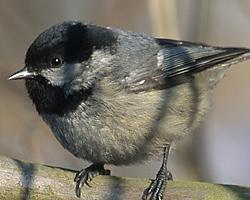
Weights and measures
| Length | from 12 to 13 cm |
|---|---|
| Weight | from 10 to 13 g |
| Wingspan | from 17 to 20 cm |
Animal description
The Crested Tit, scientifically known as Lophophanes cristatus, is a small passerine bird that belongs to the tit family, Paridae. This charming bird is particularly notable for its distinctive appearance, marked by a striking black and white head pattern and a prominent crest that gives it its name. The crest, which can be raised and lowered depending on the bird's mood, adds a touch of elegance and character, making the Crested Tit easily distinguishable from other members of the tit family.Measuring about 11 to 12 centimeters in length and weighing around 10 to 13 grams, the Crested Tit is a compact bird with a robust body and a short, stout bill suited for its diet of insects, seeds, and spiders. The bird's plumage is a mix of beautiful grays, whites, and browns, providing it with excellent camouflage against the tree bark and foliage of its natural habitat.
The Crested Tit is predominantly found in coniferous forests, especially those dominated by pine trees, across Europe and parts of Asia. It prefers mature forests where it can find its preferred nesting sites in holes in trees or sometimes in old woodpecker nests. Unlike some of its more migratory tit cousins, the Crested Tit tends to be a resident bird, staying within its territory year-round.
The bird's song is a distinctive series of notes that can vary regionally, but often includes a high-pitched trill. This vocalization plays a crucial role in communication, especially during the breeding season when males sing to attract mates and establish territories. The breeding season sees these birds exhibiting remarkable ingenuity in nest-building, often lining their nests with a variety of natural materials to ensure comfort and warmth for the eggs and, subsequently, the chicks.
The diet of the Crested Tit is varied and changes with the seasons. During spring and summer, it primarily feeds on insects, caterpillars, and spiders, gleaning them from tree branches and trunks. In autumn and winter, its diet shifts towards seeds, particularly those of conifers, which it adeptly extracts with its strong bill. This adaptability in feeding habits is crucial for its survival through the different seasons.
Socially, the Crested Tit is known to join mixed-species feeding flocks in the non-breeding season, associating with other tits, goldcrests, and nuthatches. This behavior not only aids in finding food but also provides increased protection against predators.
Conservation-wise, the Crested Tit is currently considered to be of least concern by the International Union for Conservation of Nature (IUCN), indicating a stable population. However, like many forest-dwelling species, it faces threats from habitat loss and fragmentation. Maintaining and protecting the mature coniferous forests that these birds call home is essential for their continued survival.
In summary, the Crested Tit is a small, beautifully marked bird with a distinctive crest, thriving in the coniferous forests of Europe and parts of Asia. Its unique appearance, intriguing behaviors, and melodious song make it a fascinating subject of study and a beloved bird among birdwatchers and nature enthusiasts alike.
Map of occurrence

Similar Animals
New photos of animals
Top 10 animals
- Dolphin gull (Leucophaeus scoresbii)
- Diana monkey (Cercopithecus diana)
- Moustached guenon (Cercopithecus cephus)
- Galápagos tortoise (Geochelone nigra complex)
- Japanese macaque (Macaca fuscata)
- Stone loach (Barbatula barbatula)
- Russian tortoise (Testudo horsfieldii)
- Greek tortoise (Testudo graeca)
- Common flying dragon (Draco volans)
- Vendace (Coregonus albula)


